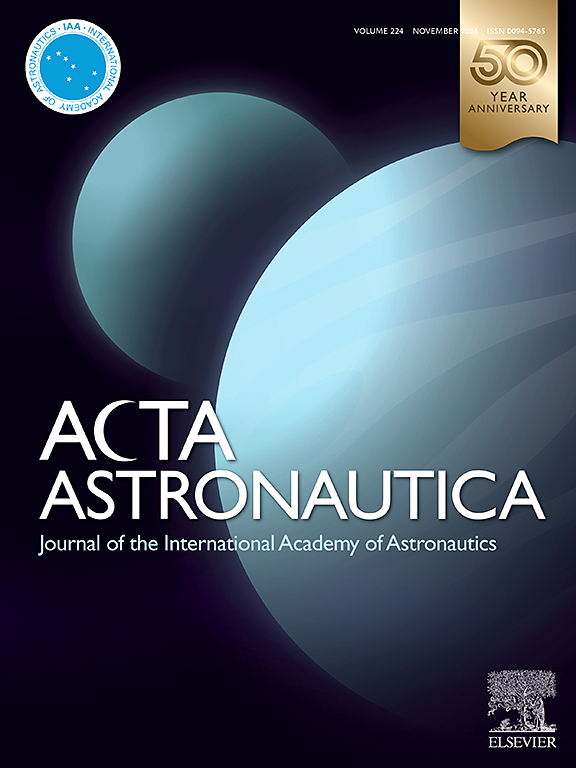The protection of AI-based space systems from a data-driven governance perspective
IF 3.1
2区 物理与天体物理
Q1 ENGINEERING, AEROSPACE
引用次数: 0
Abstract
Space infrastructures have long represented the pinnacle of technological and engineering achievements. This complexity has been further amplified by the advent of the new space race, where private actors are taking the lead, alongside states, in deploying thousands of satellites in outer space. The outer space environment of 2040 will look very different from today. Spacecraft will necessitate more frequent maneuvers to avoid potential collisions, with the need to be more conscious of their surroundings. Indeed, as the frequency of events and the number of space objects rises, decision-making tasks will increasingly challenge human operators, especially as physical and temporal margins diminish. Such complexity is enveloping thanks to the synergy of space technologies and Artificial Intelligence (AI), which is transforming the functioning of space systems.
The forward trajectory clarifies the significance that AI in outer space will retain in the years ahead. The Corpus Juris Spatialis finds itself at a crossroads, faced with the defiance of withstanding the technological advances catalyzed by the impending integration of AI into all facets of space missions. Given the ubiquitous nature of AI, its implementation will invariably pose multifaceted legal challenges across diverse aspects of International Space Law. The acquired autonomy of space assets prompts crucial questions regarding the legal standards applicable to AI in outer space, and how these autonomous space systems should be protected against hostile interference.
The main purpose of this paper, presented by the Space Law and Policy Project Group of the Space Generation Advisory Council (SGAC), is to examine the pivotal legal dimensions stemming from the automation of space-based applications from a ‘data-driven governance’ standpoint. The increase in production and acquisition of space data will just augment the sophistication of AI systems, therefore necessitating their data assets to be reliable, accurate, and consistent to safeguard the long-term success of AI technologies in space missions. The paper aims to address the overarching legal challenges posed by the integration of AI into outer space operations, specifically on cybersecurity, intellectual property, and data governance, which are critical for safeguarding autonomous systems. By examining the various nuances of these domains, it seeks to contribute to a comprehensive understanding of the legal landscape of the current AI-space pairing. Ultimately, the conclusion will offer a set of recommendations to pave the way for a secure, ethical evolution of autonomous space systems in the near future.
从数据驱动的治理角度保护基于人工智能的空间系统
空间基础设施长期以来一直代表着技术和工程成就的顶峰。新的太空竞赛的到来进一步加剧了这种复杂性,私人行为体正在与国家一道带头在外层空间部署数千颗卫星。2040年的外太空环境将与今天大不相同。航天器将需要更频繁的机动以避免潜在的碰撞,同时需要对周围环境有更强的意识。事实上,随着事件发生的频率和空间物体数量的增加,决策任务将日益挑战人类操作者,特别是在物理和时间边界缩小的情况下。由于空间技术和正在改变空间系统功能的人工智能(AI)的协同作用,这种复杂性正在被包围。向前发展的轨迹阐明了人工智能在未来几年将在外层空间保持的重要性。空间法学语料库(Corpus Juris Spatialis)发现自己正处于一个十字路口,面临着技术进步的挑战,这些进步是由即将到来的人工智能整合到太空任务的各个方面所推动的。鉴于人工智能的普遍性,其实施必然会在国际空间法的各个方面带来多方面的法律挑战。空间资产获得自主权引发了一些关键问题,涉及适用于外层空间人工智能的法律标准,以及应如何保护这些自主空间系统免受敌对干扰。本文由空间生成咨询委员会(SGAC)空间法律和政策项目组提出,其主要目的是从“数据驱动治理”的角度审视天基应用自动化所产生的关键法律层面。空间数据的生产和获取的增加只会增加人工智能系统的复杂性,因此需要他们的数据资产是可靠的、准确的和一致的,以保障人工智能技术在太空任务中的长期成功。本文旨在解决将人工智能整合到外层空间作战中所带来的总体法律挑战,特别是在网络安全、知识产权和数据治理方面,这对保护自主系统至关重要。通过研究这些领域的各种细微差别,它旨在有助于全面了解当前人工智能空间配对的法律格局。最终,该结论将提供一套建议,为在不久的将来实现自主空间系统的安全、合乎道德的演变铺平道路。
本文章由计算机程序翻译,如有差异,请以英文原文为准。
求助全文
约1分钟内获得全文
求助全文
来源期刊

Acta Astronautica
工程技术-工程:宇航
CiteScore
7.20
自引率
22.90%
发文量
599
审稿时长
53 days
期刊介绍:
Acta Astronautica is sponsored by the International Academy of Astronautics. Content is based on original contributions in all fields of basic, engineering, life and social space sciences and of space technology related to:
The peaceful scientific exploration of space,
Its exploitation for human welfare and progress,
Conception, design, development and operation of space-borne and Earth-based systems,
In addition to regular issues, the journal publishes selected proceedings of the annual International Astronautical Congress (IAC), transactions of the IAA and special issues on topics of current interest, such as microgravity, space station technology, geostationary orbits, and space economics. Other subject areas include satellite technology, space transportation and communications, space energy, power and propulsion, astrodynamics, extraterrestrial intelligence and Earth observations.
 求助内容:
求助内容: 应助结果提醒方式:
应助结果提醒方式:


